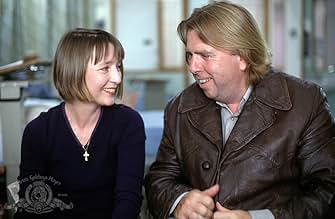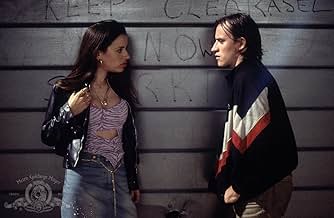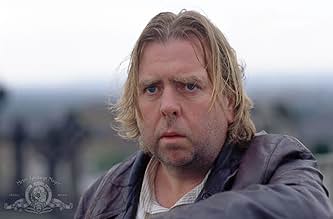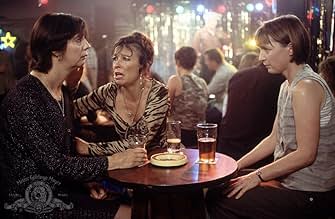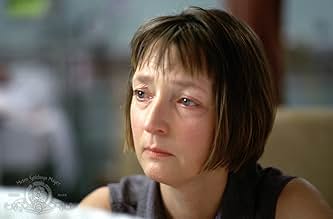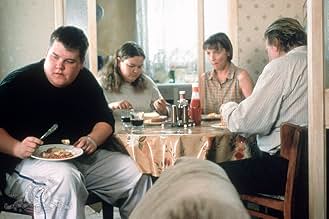All or Nothing
- 2002
- Tous publics
- 2h 8min
NOTE IMDb
7,5/10
12 k
MA NOTE
Dans un foyer pauvre de la classe ouvrière à Londres, l'amour de Penny pour son partenaire, Phil, chauffeur de taxi, se tarit, mais lorsqu'une tragédie imprévue survient, la communauté local... Tout lireDans un foyer pauvre de la classe ouvrière à Londres, l'amour de Penny pour son partenaire, Phil, chauffeur de taxi, se tarit, mais lorsqu'une tragédie imprévue survient, la communauté locale se resserre et leur flamme ressurgit.Dans un foyer pauvre de la classe ouvrière à Londres, l'amour de Penny pour son partenaire, Phil, chauffeur de taxi, se tarit, mais lorsqu'une tragédie imprévue survient, la communauté locale se resserre et leur flamme ressurgit.
- Réalisation
- Scénario
- Casting principal
- Récompenses
- 3 victoires et 13 nominations au total
Avis à la une
"All or Nothing" certainly isn't a movie for the masses and I'm sure that many people will never see it or even think about seeing it and that is a shame. It's true that it is a rather depressing movie, at first sight, when you don't look closer and don't get involved in the story. When you take the time to dig deeper, you'll not only see the misery, but also a beautiful thing called love.
In this movie we mostly follow Phil, a gentle guy who works as a taxi-driver and who lives together with his wife and two children in some social housing complex in London. His daughter works in a retirement home, his son hasn't got a job and his wife works on the checkout at a supermarket. They have the biggest problems to make both ends meet every month, but that's not Phil's biggest concern. He doesn't care much for life anymore, because his wife no longer loves him. But than something terrible happens to the family, bringing them all together again, as close or perhaps even closer as they have ever been...
This movie is very realistic, hard and dark, but in the same time it is also very heart-warming. This certainly isn't a sugar sweet love story like we get too often from the big Hollywood studio's. This is what real life is like for many people. It has a social engagement (showing that even in biggest misery, people still care for each other and help each other), that probably will never be found in a Hollywood production.
I guess it will be understand and loved more by people who like realistic movies in general and socially engaged movies in particular. I might even say that it will be loved more by the people who are used to watch other European movies (Scandinavian, Spanish, French,... movies often have a deeper meaning included). Personally I liked what I saw and that's why I give this movie a 7.5/10.
In this movie we mostly follow Phil, a gentle guy who works as a taxi-driver and who lives together with his wife and two children in some social housing complex in London. His daughter works in a retirement home, his son hasn't got a job and his wife works on the checkout at a supermarket. They have the biggest problems to make both ends meet every month, but that's not Phil's biggest concern. He doesn't care much for life anymore, because his wife no longer loves him. But than something terrible happens to the family, bringing them all together again, as close or perhaps even closer as they have ever been...
This movie is very realistic, hard and dark, but in the same time it is also very heart-warming. This certainly isn't a sugar sweet love story like we get too often from the big Hollywood studio's. This is what real life is like for many people. It has a social engagement (showing that even in biggest misery, people still care for each other and help each other), that probably will never be found in a Hollywood production.
I guess it will be understand and loved more by people who like realistic movies in general and socially engaged movies in particular. I might even say that it will be loved more by the people who are used to watch other European movies (Scandinavian, Spanish, French,... movies often have a deeper meaning included). Personally I liked what I saw and that's why I give this movie a 7.5/10.
Phil (Timothy Spall) is an overweight taxi driver who gets up late in the day and works intermittently, barely communicating with his family except for a few grunts. His philosophy of life is expressed as "We're all born alone. We die alone. There's nothing we can do about it". Mike Leigh has given us powerful portrayals of the underclass in his previous films Naked, Secrets and Lies, and Life is Sweet but none more powerful and moving than his latest, All or Nothing.
In this film, Leigh looks at three families living in a dreary South London housing complex and captures their lives with an intimacy that is almost unbearable. All or Nothing has a documentary feel, almost as if the camera was just planted in the middle of the living room to observe. The conditions are familiar: unemployment and underemployment, alcoholism, teen pregnancy, isolation, and the inevitable loss of self-esteem and despair. It is, however, more than a drama of oppressive social conditions, but also of lack of communication between people who desperately need love but are too afraid or lethargic to ask for it.
Spall's performance is a revelation. His unshaven face, disheveled hair, and hangdog expression communicate deep resignation. The film is bleak but Leigh mixes its heartbreak with joy. When a neighbor Maureen (Ruth Sheen) sings ''Don't It Make My Brown Eyes Blue,'' at a karaoke bar, her eyes shine with a glow that seems at odds with the rest of her life but is so contagious that even her most dispirited friends take notice.
It is obvious, from the start that something is amiss. Phil says nothing when his obese son Rory (James Cordon) hurls words of abuse at his common-law wife Penny. Rory is an overweight bully who does nothing but lay around the house, watching TV and hurl insults at everyone in his path. Sister Rachel (Alison Garland) has a job cleaning up at a nursing home but also seems to be going through the motions of living except when she is interacting with patients. Penny works in a supermarket and does just about everything to keep the family going, but it never seems to be enough. The film's sub-plots add to the feeling of life reeling out of control, but none of these are fully developed and are just dropped without tying up the loose ends. Maureen's teenage daughter is pregnant by some lout that doesn't give two hoots about her. Another resident, unemployed Samantha (Sally Hawkins) hates her parents and finds herself seducing a very strange young man (Ben Crompton) lurking in the shadows of the complex grounds.
The second half of the film concentrates mainly on Phil and his family. When a medical emergency occurs, the family begins to open up and express long buried feelings of hurt and resentment. The final confrontation between Phil and Penny achieves an explosive power. Phil tells Penny that when he's had enough, he just switches off the meter on his taxi. Penny responds that she doesn't have the luxury of turning off a switch and making everything go away, that she is still responsible for the daily chores and the condition of the family. After Phil finally reveals his deepest fears, a transformation occurs that is unmistakably reflected in the family's facial expressions and body language.
Leigh does not offer simple solutions, but seems to be telling us that although life is painful, we can reach beyond the pain to get in touch with the beauty. He shows us that love is the glue that holds families together and that either there is love or there's nothing. As a result, All or Nothing pulsates with a humanity that, in spite of its bleakness, is life affirming and ultimately uplifting, reminding us that beyond bitterness, there is love, and beyond suffering, there is grace.
In this film, Leigh looks at three families living in a dreary South London housing complex and captures their lives with an intimacy that is almost unbearable. All or Nothing has a documentary feel, almost as if the camera was just planted in the middle of the living room to observe. The conditions are familiar: unemployment and underemployment, alcoholism, teen pregnancy, isolation, and the inevitable loss of self-esteem and despair. It is, however, more than a drama of oppressive social conditions, but also of lack of communication between people who desperately need love but are too afraid or lethargic to ask for it.
Spall's performance is a revelation. His unshaven face, disheveled hair, and hangdog expression communicate deep resignation. The film is bleak but Leigh mixes its heartbreak with joy. When a neighbor Maureen (Ruth Sheen) sings ''Don't It Make My Brown Eyes Blue,'' at a karaoke bar, her eyes shine with a glow that seems at odds with the rest of her life but is so contagious that even her most dispirited friends take notice.
It is obvious, from the start that something is amiss. Phil says nothing when his obese son Rory (James Cordon) hurls words of abuse at his common-law wife Penny. Rory is an overweight bully who does nothing but lay around the house, watching TV and hurl insults at everyone in his path. Sister Rachel (Alison Garland) has a job cleaning up at a nursing home but also seems to be going through the motions of living except when she is interacting with patients. Penny works in a supermarket and does just about everything to keep the family going, but it never seems to be enough. The film's sub-plots add to the feeling of life reeling out of control, but none of these are fully developed and are just dropped without tying up the loose ends. Maureen's teenage daughter is pregnant by some lout that doesn't give two hoots about her. Another resident, unemployed Samantha (Sally Hawkins) hates her parents and finds herself seducing a very strange young man (Ben Crompton) lurking in the shadows of the complex grounds.
The second half of the film concentrates mainly on Phil and his family. When a medical emergency occurs, the family begins to open up and express long buried feelings of hurt and resentment. The final confrontation between Phil and Penny achieves an explosive power. Phil tells Penny that when he's had enough, he just switches off the meter on his taxi. Penny responds that she doesn't have the luxury of turning off a switch and making everything go away, that she is still responsible for the daily chores and the condition of the family. After Phil finally reveals his deepest fears, a transformation occurs that is unmistakably reflected in the family's facial expressions and body language.
Leigh does not offer simple solutions, but seems to be telling us that although life is painful, we can reach beyond the pain to get in touch with the beauty. He shows us that love is the glue that holds families together and that either there is love or there's nothing. As a result, All or Nothing pulsates with a humanity that, in spite of its bleakness, is life affirming and ultimately uplifting, reminding us that beyond bitterness, there is love, and beyond suffering, there is grace.
Lets be honest, Mike Leigh's films are not for everyone. No effort is made to make them commercially viable, the cast are almost always, largely unknown and certain scenes are so harrowing that even the strongest viewer can find themselves distressed and perturbed. While these factors keep some people away, they also keep many others coming back time and time again. Mike Leigh is quite simply, a national treasure. And I don't mean that in the same fluffy "Gawd Bless 'Em" manner that people applied to Thora Hird and the Queen Mother. I mean that he is simply one of the finest and most honest chroniclers of contemporary Britain that we have produced.
Make no mistake, the British have always enjoyed social realism. We can gauge that through that great yardstick of social self-perceptions, the soap opera. While the Americans produce soaps full of tanned, successful oil barons and their supermodel / actress mistresses, and the Australians show us their blue collar bungalow owners who like a beer with their mates and a barbecue on Sundays, the British make soaps full of characters who are little more than diluted, softened incarnations of Leigh's own subjects. People who work at checkouts and in launderettes, people who are trapped by poverty, alcoholism, violence and stifled or strangled ambition.
But through it all , there's a hope, an anticipation of a better day just around the corner and that's what makes these films ultimately uplifting. Leigh has always shown that no matter how dire the circumstances, how forlorn the existence, love and hope, friendship and family, will find a way to offer support, comfort and succor.
In achieving this, Leigh has the assistance of another of the U.K.'s finest - Timothy Spall. If ever an actor was capable of portraying at once the fragility, insecurity and yet the potential for sheer stubborn strength of the British psyche its Spall. His character in All or Nothing, Phil is an incredibly vulnerable man. A pensive, gentle man, trapped in his own doubts and in a world of people who react by lashing out, verbally or physically and so compounding his doubts and fear. He apologises constantly, and often appears to be apologising for simply existing. An under-educated but intellectual man he even apologises for having an extensive vocabulary, a character trait which Leigh uses cleverly but subtly by having Phil precede each "big word" with "wotsitsname". It appears that Phil is searching for the word, he isn't, he knows exactly what he's about to say but is reluctant to say it in case he appears educated or articulate. We hear Phil talk about destiny and saying "It's...wotsitsname..kismet". In a world of expletives and harsh words he's ashamed at his verbal dexterity viewing it as a weakness rather than a strength.
Devices such as these help us understand technically why Leigh is just such a good writer and the way in which these devices are performed help us understand why Leigh constantly looks to Spall to anchor his scripts with his marvelous humanity.
All or Nothing is a vicious, gut wrenching, graceful, uplifting gem of a movie from a master filmmaker. Its is performed by a marvelous leading man and a collection of wonderfully talented supporting actors. In a world of blockbusters and multi million dollar opening nights Mike Leigh continues to give us humanity, despair, courage and beauty. And do we ever need him.
Make no mistake, the British have always enjoyed social realism. We can gauge that through that great yardstick of social self-perceptions, the soap opera. While the Americans produce soaps full of tanned, successful oil barons and their supermodel / actress mistresses, and the Australians show us their blue collar bungalow owners who like a beer with their mates and a barbecue on Sundays, the British make soaps full of characters who are little more than diluted, softened incarnations of Leigh's own subjects. People who work at checkouts and in launderettes, people who are trapped by poverty, alcoholism, violence and stifled or strangled ambition.
But through it all , there's a hope, an anticipation of a better day just around the corner and that's what makes these films ultimately uplifting. Leigh has always shown that no matter how dire the circumstances, how forlorn the existence, love and hope, friendship and family, will find a way to offer support, comfort and succor.
In achieving this, Leigh has the assistance of another of the U.K.'s finest - Timothy Spall. If ever an actor was capable of portraying at once the fragility, insecurity and yet the potential for sheer stubborn strength of the British psyche its Spall. His character in All or Nothing, Phil is an incredibly vulnerable man. A pensive, gentle man, trapped in his own doubts and in a world of people who react by lashing out, verbally or physically and so compounding his doubts and fear. He apologises constantly, and often appears to be apologising for simply existing. An under-educated but intellectual man he even apologises for having an extensive vocabulary, a character trait which Leigh uses cleverly but subtly by having Phil precede each "big word" with "wotsitsname". It appears that Phil is searching for the word, he isn't, he knows exactly what he's about to say but is reluctant to say it in case he appears educated or articulate. We hear Phil talk about destiny and saying "It's...wotsitsname..kismet". In a world of expletives and harsh words he's ashamed at his verbal dexterity viewing it as a weakness rather than a strength.
Devices such as these help us understand technically why Leigh is just such a good writer and the way in which these devices are performed help us understand why Leigh constantly looks to Spall to anchor his scripts with his marvelous humanity.
All or Nothing is a vicious, gut wrenching, graceful, uplifting gem of a movie from a master filmmaker. Its is performed by a marvelous leading man and a collection of wonderfully talented supporting actors. In a world of blockbusters and multi million dollar opening nights Mike Leigh continues to give us humanity, despair, courage and beauty. And do we ever need him.
This film is worth a hundred others because it is not an exercise in making a product and marketing it successfully- instead it is a statement by a man who is a true director, someone who feels passionately about the world we live in, and uses this fantastic medium to its highest potential.
The film is ultimately about a man (Phil, Timothy Spall) who has philosophized about life to the point where nothing matters to him anymore. The only thing that brings him back around the world of the living is (the only thing any of us really need for happiness)... Love.
For me, that is one of the most pertinent and beautiful things that someone with a voice in society can say.
P.S. It is highly likely that if anyone found this film 'too depressing' than they are not really primed to expect anything other than the beauty and predictability of
hollywood film. And in response to the chap who refutes the existence of such misery in the real world: you are obviously a lucky, privileged chap.
The film is ultimately about a man (Phil, Timothy Spall) who has philosophized about life to the point where nothing matters to him anymore. The only thing that brings him back around the world of the living is (the only thing any of us really need for happiness)... Love.
For me, that is one of the most pertinent and beautiful things that someone with a voice in society can say.
P.S. It is highly likely that if anyone found this film 'too depressing' than they are not really primed to expect anything other than the beauty and predictability of
hollywood film. And in response to the chap who refutes the existence of such misery in the real world: you are obviously a lucky, privileged chap.
Mike Leigh makes this movie as a sociological study because he wants us to be confronted with the state of mind of the working class of now. There is more poverty in the slums nowadays than say twenty years ago! Family-life is disrupted and children have many problems: overweight, sexual harassment, abortion (?). How will the rent be paid? And the loan of the taxi? What is going on in the mind of our son who does only look television and eat until he becomes fat? Why is my woman unhappy, do we still talk to each other? We are proud of our daughter who is a nurse for elderly people, but what is happening with our son? Even the dialogues in the taxi are splendid!
Le saviez-vous
- AnecdotesFirst cinema feature of Sally Hawkins.
- ConnexionsFeatured in The South Bank Show: Mike Leigh (2002)
Meilleurs choix
Connectez-vous pour évaluer et suivre la liste de favoris afin de recevoir des recommandations personnalisées
- How long is All or Nothing?Alimenté par Alexa
Détails
- Date de sortie
- Pays d’origine
- Langues
- Aussi connu sous le nom de
- Untitled Mike Leigh Project
- Lieux de tournage
- Sociétés de production
- Voir plus de crédits d'entreprise sur IMDbPro
Box-office
- Budget
- 9 000 000 $US (estimé)
- Montant brut aux États-Unis et au Canada
- 201 546 $US
- Week-end de sortie aux États-Unis et au Canada
- 25 890 $US
- 27 oct. 2002
- Montant brut mondial
- 2 847 049 $US
- Durée
- 2h 8min(128 min)
- Couleur
- Mixage
- Rapport de forme
- 1.85 : 1
Contribuer à cette page
Suggérer une modification ou ajouter du contenu manquant

